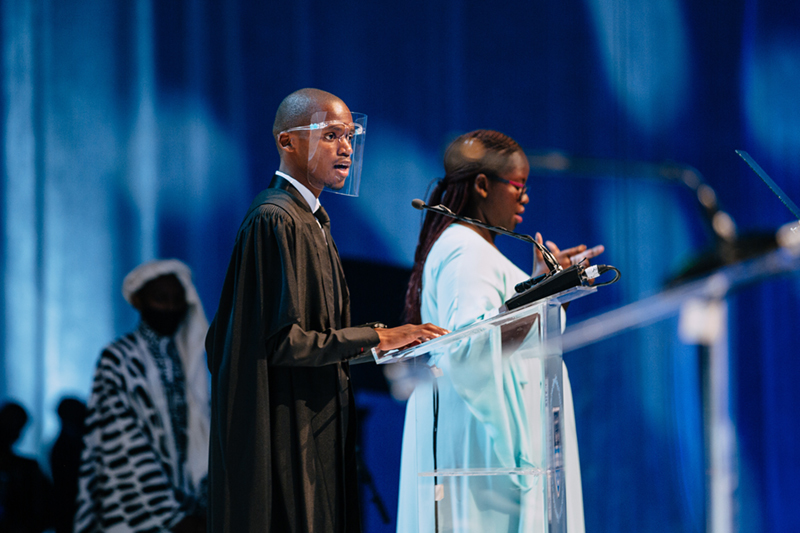New SRC president aims to be a ‘servant of the students’
17 December 2021 | Story Helen Swingler. Photo Robyn Walker. Read time 8 min.
Action-based with a focus on “we” is how the University of Cape Town (UCT) Students’ Representative Council’s (SRC) new president, Mila Zibi, describes his leadership style. His mission, he said, is to be a “servant of the students”.
Zibi, of the Economic Freedom Fighters Student Command (EFFSC), will lead the new, 15-member SRC during its term of office from 1 November 2021 until 31 October 2022.He spoke with UCT News about his role and plans.
Helen Swingler (HS): Please tell us a bit about yourself.
Mila Zibi (MZ): I am 20 years old and from Gqeberha in the Eastern Cape. I am studying towards a Bachelor of Social Science degree. Initially I had hoped to be an academic, but as things stand, I plan to study a postgraduate certificate in education and go to work for my family.
HS: How do you feel about the responsibility of SRC head? The past year has not been an easy time for students – or the university – in the wake of the COVID-19 pandemic.
MZ: Well, I feel very honoured to have been elected and to be acting as a servant of the students once again. It shows that the work that I’ve been doing in representing students since enrolling in UCT is recognised and appreciated by students.
HS: What were voter percentages this year, up or down from last year?
MZ: The voter percentage was 27.7%, which is a slight decrease from last year’s 28%.
HS: Have you served on any other student organisations at UCT, or in other leadership roles?
MZ: Yes, I was Kopano head student, the co-chair of the Residence Council, chairperson of the EFFSC, a student representative on the Residences Committee, Institutional Forum, University Student Affairs Committee, and various other structures.
“I plan to introduce initiatives that will ensure students benefit and utilise them in the long term.”
HS: What do you hope to contribute to the student body and experience as SRC president?
MZ: I hope to contribute more of what I’ve previously committed to [through my student leadership work]: being a radical and action-based leader who will be able to bring about and realise change as quickly as possible. I hope to contribute towards making students’ life experiences easier.
HS: How would you describe your leadership style?
MZ: I believe in the “we”, in collective leadership, what Marxists term democratic centralism. [I believe in] a leadership style that is strong, robust and empowers everyone, and of course [I believe in] radicalism and militancy, without a doubt. Above all, I subscribe to values of dedication, honesty and love for those that I represent.
HS: What are the key issues you plan to focus on in your term of office, given the controversy over mandatory COVID-19 vaccines and the plan to adopt a hybrid approach to teaching and learning in 2022?
MZ: I plan to introduce initiatives that will ensure students benefit and utilise them in the long term. I plan to focus on the question of access to higher education and funding. I also hope to further [the process of] decolonisation as something beyond just a project, but a way of life. I plan to advocate for a return to campus and normalcy.
HS: How, if at all, are these linked to your personal political affiliations?
MZ: These all link to my political affiliation as they inform and influence how I think, conduct myself and perform my duties. I am a member of the only Marxist-Leninist and Fanonian school of thought party in South Africa, the leftist Economic Freedom Fighters
“Not only do I understand, but I know the struggles faced by many disadvantaged students within our university.”
HS: What life lessons do you bring to your SRC presidency?
MZ: I bring a life lesson of having to learn to overcome difficulty. As a child of a working-class mother and an unemployed father, not only do I understand, but I know the struggles faced by many disadvantaged students within our university.
HS: Everyone brings a different perspective and mandate to the SRC presidency. What do you hope your legacy will be as SRC president?
MZ: Without a doubt, the notion and vision to disrupt; we must constantly disrupt the status quo and make the racist system tremble at its feet. We shall continue being committed and serving students’ best interests and to the best of our capabilities. We will build on providing support to students who are financially in need.
HS: Will you be working with other SRCs around the country in terms of national issues for universities?
MZ: I believe that the only way to implement effective change is if we are nationally coordinated as SRCs. We have begun that project as we seek to formulate a synchronised response to the proposed 2022 funding ‘guidelines’ by NSFAS and Minister [of Higher Education, Science and Innovation] Dr Blade Nzimande.
HS: Juggling studies and extra-mural roles can be very demanding. How are you planning to manage this balance?
MZ: I must be honest, it’s not easy but I am undergoing training and lessons on time management to effect the balance. At times, we easily forget that we are students too while serving other students.
HS: What legacies from the former SRC will you and your SRC team build on?
MS: I hope my legacy will be that of being an action-based leader and SRC in solving student matters; one where we do not become a help desk or a communication desk between management and students. I hope to be proactive rather than reactive to situations and possible faults within our system and its bureaucracy. I hope to bring a legacy of sustainability through the projects that will be implemented in our term.
HS: Is there anything else you’d like to add?
MZ: I’d like to add by thanking those who voted for us. We shall ensure that we are a radical and leftist voice that stands for the black, poor and marginalised students. I wish to add that the SRC does not exist in a vacuum outside of the influence and scope of politics, therefore it is a political structure. When we ran, we ran as political beings, therefore attempts to depoliticise the structure are nothing but feeble attempts in perpetuation of the status quo. Thank you.
Mila Zibi: President
Siya Plaatjie: Vice-president
Sandile Monoane: Secretary-general
Abicha Tshiamala: Deputy secretary-general
Kumkani Goqoza: Treasurer-general
Thalente Gumbi: Corporate relations & fundraising coordinator
Cheryl Sambadzai: International students coordinator
Sinelizwi Somdaka: Labour and student services coordinator
Yanganani Sibeko: Undergraduate academics coordinator
Oratile Thothela: Postgraduate academics coordinator
Jesse Griesel: Residence and housing coordinator
Katleho Mthenjane: Social responsiveness coordinator
Phila Phakathi: Societies and day houses coordinator
Awonke Ntshonga: Sports and recreation coordinator
 This work is licensed under a Creative Commons Attribution-NoDerivatives 4.0 International License.
This work is licensed under a Creative Commons Attribution-NoDerivatives 4.0 International License.
Please view the republishing articles page for more information.










